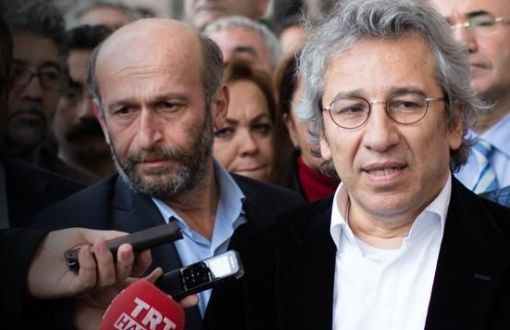Index relies entirely on the support of donors and readers to do its work.
Help us keep amplifying censored voices today.

Journalists Erdem Gül and Can Dündar in November 2015 (Photo: Bianet)
The sentencing of journalists Can Dündar and Erdem Gül to years in prison for sharing state secrets underscores how Turkey’s government is crushing critical voices. The trial follows Dündar and Gül’s investigative reporting on links between the Turkish intelligence services and arms to Islamist groups in Syria. Dundar has been sentenced to five years and 10 months, and Gul to five years.
Index on Censorship condemns this clearly political ruling and calls for an end to judicial harassment of Dündar, Gül and all journalists in the country. The country’s drastic decline has been well documented by Index’s Mapping Media Freedom project and Reporters Without Borders’ World Press Freedom Index. The closure of the seized Zaman newspaper group is only one recent example of the government’s draconian attitude toward independent media.
“The Turkish government is now resorting to locking up journalists like Dündar and Gül, who sought to reveal information of public interest, something journalists around the world do every day. Yet they are paying a heavy price. The sentencing is an example of an ongoing decline in Turkey’s attitude to freedom. It has entered a new dark age where the truth is forbidden and even a hint of dissent is not tolerated,” Melody Patry, senior advocacy officer, Index on Censorship, said.
From the outset of the case in November 2015, Dündar, the editor-in-chief of daily newspaper Cumhuriyet, and Gül, head of the paper’s Ankara bureau, were accused of spying and terrorism after the paper published evidence in May 2015 of Turkey’s intelligence services’ involvement in Syria’s civil war. In the wake of the revelations, Recep Tayyip Erdogan, president of Turkey, publicly declared that Dundar and his paper “will pay for this”.
Dündar nearly paid with his life. Shortly before a court issued his sentence, a man identified in Daily Sabah as Murat Şahin attempted to shoot the editor, but was thwarted by the intervention of Dundar’s wife and an onlooker.
Both Dündar and Gül are free on bail as they appeal their sentences.
Index on Censorship welcomes the release of journalists Can Dündar and Erdem Gül after Turkey’s Constitutional Court ruled that their rights had been violated by their arrest. Index strongly reiterates its call for Turkish authorities to drop all charges against the pair.
Dündar, the editor-in-chief of the Turkish daily Cumhuriyet, and his Ankara bureau chief, Gül, had been held since the evening of 26 November. They are charged with spying and terrorism because last May they published evidence of arms deliveries by the Turkish intelligence services to Islamist groups in Syria.
The arrests of the two journalists underscored extreme lengths that the government of Turkish president Recep Erdogan had taken to stifle dissent and restrict access to information. In the past 12 months, there have been 106 verified violations of media freedom reported to Index on Censorship’s Mapping Media Freedom project.
In September the award-winning Turkish journalist Can Dündar calls for German journalists to pick up the investigation he was forced to abandon and more generally for cross-country collaboration amongst journalists. Dündar has been in exile in Germany since 2016 following an arrest warrant against him in Turkey. Index campaign outside the Turkish Embassy, London, against this warrant and other intimidations of journalists in Turkey.
In October the Times Literary Supplement describes the magazine as “an archive of past battles won, and a beacon of present and future struggles. Its unique brand of practical, practising advocacy is as necessary as ever.”
In November magazine editor Rachael Jolley wins editor of the year award at the British Society of Magazine Editors. With the rise of Donald Trump the magazine is deemed to be of critical importance.
[vc_row][vc_column][vc_column_text]This article is part of Index on Censorship partner Global Journalist’s Project Exile series, which has published interviews with exiled journalists from around the world.[/vc_column_text][vc_custom_heading text=”“I try to live isolated to protect myself. “”][vc_separator][/vc_column][/vc_row][vc_row][vc_column][vc_column_text]

Zubyede Sari
When she got her start in the news business in 2009, Turkish journalist Zübeyde Sari couldn’t have imagined her chosen profession would cause her to have to leave her homeland.
At that time, Turkey’s then-prime minister Recep Tayyip Erdogan was making peace overtures to Kurdish separatists, the Arab Spring that triggered civil war in neighbouring Syria was still more than a year away, and Turkish journalists and opposition parties had significant latitude to criticise Erdogan and the ruling AKP party.
After graduating from university in the southern port town of Mersin, Sari later moved east to the mainly Kurdish city of Diyarbakir, about 60 miles (97km) from the Syrian border. There she became a correspondent for BBC Turkish and the pro-Kurdish IMC TV, eventually covering the Syrian civil war as well as Turkey’s conflict with the PKK, a Kurdish militia.
Yet Turkey was becoming a more restrictive place for journalists. Censorship increased after massive protests in 2013 in Istanbul’s Gezi Park. Gezi Park. In 2016, a failed military coup against President Erdogan triggered a ferocious crackdown on dissidents. More than 150,000 civil servants, police officers and academics were fired from government jobs for suspected disloyalty, according to a tally from the website Turkeypurge.com. Over 300 journalists were arrested and 189 media outlets shut down. IMC TV was raided by police and shutdown mid-broadcast.
Sari survived the initial purges, but in late 2018 she was forced to flee to Germany. “I had to leave in just one night,” she says. “They put my face on all the front pages of the magazines, accusing me of being part of a broadcast television network connected to the Kurdish movement. The next day, I would have woken up with the police knocking at my front door.”
Soon after leaving, she published an article for the site SuperHaber.tv detailing collaboration between the ruling AKP party and Turkish security in the construction of hidden prisons for political dissidents. Now 36, she lives in Berlin, Germany and works for Özgürüz [We Are Free], an online Turkish news portal founded by the well-known exiled journalist Can Dündar.
Sari, who still fears threatened by the many pro-Erdogan Turkish immigrants in Germany, spoke with Global Journalist’s Arianna Suardi. Below, an edited version of their interview:
Global Journalist: Why exactly were you targeted?
Sari: It’s complicated, but I think the Turkish government chose to target me because I’m reporting the truth about the political situation in Turkey. I talk about corruption and the lack of freedom of expression, and of course Erdogan’s party doesn’t like it. I also have friends who are Kurdish and [minority] Alevis and that’s probably why I’ve been accused of being one of them.
GJ: How was it to leave in just one night?
Sari: I’m still under the impact of that feeling. You basically leave your life behind with a small suitcase. It was November 2018, in one night I packed all the things I could and in the early morning I went to the airport and I took the first plane to Berlin.
I feel I don’t belong in this place. Leaving your country is a problem, but settling down in another one isn’t easy either.
GJ: Is life in Germany different than you imagined?
Sari: I’m working for Özgürüz. I can do my profession and I’ve been supported by [press freedom group] Reporters Without Borders. But it’s still very difficult here, more than I imagined. That’s why I started getting therapy. One important aspect is that I don’t speak German. I’m basically restarting my life from the beginning.
GJ: When do you think it will be possible to go back to Turkey?
Sari: I’ve packed my luggage everyday hoping to go back, and I’m still doing it. The problem is the climate of freedom of expression – in Turkey it’s terrible. You need press cards from the government to be a journalist. The government has full control over press card distribution. All the media outlets in Turkey are controlled by Erdogan, and if you’re not part of them you’re considered a terrorist or a traitor.
GJ: Now that you’re in Germany, do you feel free to express yourself or do you still feel pressure?
Sari: No, I can’t express myself. No one has actually threatened me so far, but I just try to hide myself as a form of protection. Sometimes I have the feeling that [Turkish] people in Germany do not really understand what is happening in Turkey, and that is the reason why they sympathise with Erdogan.
I prefer ignoring them rather than get into trouble…I try to avoid every private and personal conversation because I’m scared. It’s not easy, but when, for example, I have to take a taxi, I don’t reveal my identity nor my views about politics. Just yesterday, I was in a taxi and I lied about my profession, I said I was an accountant because I didn’t feel safe. I lie all the time, and I try to live isolated to protect myself.[/vc_column_text][/vc_column][/vc_row][vc_row][vc_column width=”1/2″][vc_video link=”https://youtu.be/6BIZ7b0m-08″][/vc_column][vc_column width=”1/2″][vc_column_text]Index on Censorship partner Global Journalist is a website that features global press freedom and international news stories as well as a weekly radio program that airs on KBIA, mid-Missouri’s NPR affiliate, and partner stations in six other states. The website and radio show are produced jointly by professional staff and student journalists at the University of Missouri’s School of Journalism, the oldest school of journalism in the United States.[/vc_column_text][/vc_column][/vc_row][vc_row][vc_column][vc_custom_heading text=”Don’t lose your voice. Stay informed.”][vc_separator color=”black”][/vc_column][/vc_row][vc_row][vc_column width=”1/2″][vc_column_text]Index on Censorship is a nonprofit that campaigns for and defends free expression worldwide. We publish work by censored writers and artists, promote debate, and monitor threats to free speech. We believe that everyone should be free to express themselves without fear of harm or persecution – no matter what their views.
Join our mailing list (or follow us on Twitter or Facebook). We’ll send you our weekly newsletter, our monthly events update and periodic updates about our activities defending free speech. We won’t share, sell or transfer your personal information to anyone outside Index.[/vc_column_text][/vc_column][vc_column width=”1/2″][gravityform id=”20″ title=”false” description=”false” ajax=”false”][/vc_column][/vc_row][vc_row][vc_column][three_column_post title=”Global Journalist / Project Exile” full_width_heading=”true” category_id=”22142″][/vc_column][/vc_row]